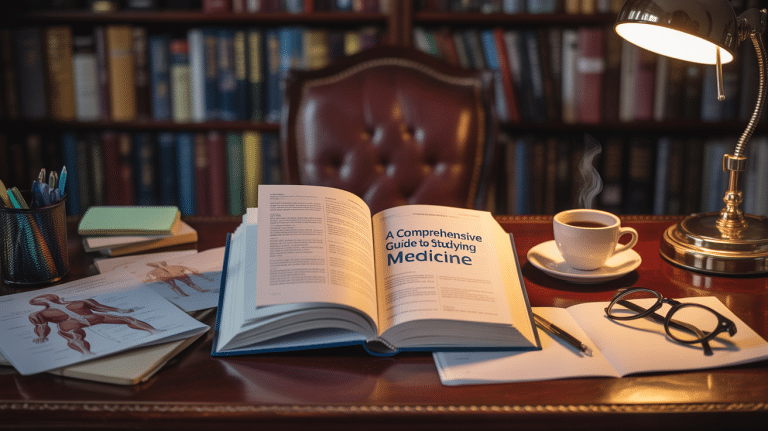A Comprehensive Guide to Studying Medicine
What is Medicine?
Medicine is a field of health sciences dedicated to the prevention, diagnosis, and treatment of illnesses and injuries. It combines the art of healing with cutting-edge scientific research, offering a fulfilling career for those passionate about improving lives through healthcare.
This program is ideal for students who aspire to become compassionate healthcare professionals, wish to advance their knowledge of human biology and health, and desire to contribute positively to society.
What Do You Study in Medicine?
Core Subjects
- Anatomy
- Understanding the structure of the human body.
- Dissection and examination of body systems.
- Physiology
- Exploring how different body systems function and interact.
- Focus on both normal and pathological conditions.
- Biochemistry
- Studying molecular processes and biochemical pathways.
- Insight into metabolic processes and their relation to health.
- Pharmacology
- Learning about drugs, their effects, and their usage in treatment.
- Discussions on medications’ mechanisms of action, side effects, and interactions.
- Pathology
- Investigating the nature of diseases.
- Discussion on disease mechanisms and how they affect bodily functions.
Elective Courses
Students may also choose elective courses to tailor their education to specific interests, which may include:
- Family Medicine
- Psychiatry
- Geriatrics
- Sports Medicine
- Emergency Medicine
Labs, Workshops, and Internships
Hands-on experience is vital in a Medicine program. Students typically participate in:
- Dissection Labs: Practical examinations of cadavers to understand human anatomy in detail.
- Clinical Workshops: Simulation-based learning environments where students can practice clinical skills, such as suturing or conducting physical examinations.
- Internships/Clinical Rotations: Practical placements in hospitals or clinics where students apply their knowledge in real-world medical settings under the supervision of licensed practitioners.
Careers After Medicine
Graduates of Medicine programs possess the knowledge to enter various healthcare professions. Common career paths include:
- Physician
- Surgeon
- Pediatrician
- Psychiatrist
- Family Doctor
- Medical Researcher
- Public Health Official
Salary Expectations
The salaries for medical professionals can vary significantly based on specialty, location, and experience level. Below are salary ranges for various positions:
- Physicians: $112,000 – $400,000 (USD) / €95,000 – €340,000 (EUR)
- Surgeons: $245,000 – $450,000 (USD) / €210,000 – €380,000 (EUR)
- Pediatricians: $125,000 – $300,000 (USD) / €105,000 – €250,000 (EUR)
- Psychiatrists: $200,000 – $300,000 (USD) / €170,000 – €250,000 (EUR)
Salaries can greatly vary by country, and it is advisable to research specific markets of interest.
Is Medicine Hard to Study?
Studying Medicine is often considered one of the most challenging academic paths. Common challenges faced by students include:
- Extensive Material: The volume of information to be learned is substantial, from complex terminology to intricate biological concepts.
- Intense Workload: The combination of classes, labs, and clinical rotations demands a significant time commitment, often leading to long hours of study.
- Emotional Resilience: Medical students must face difficult situations, including the suffering of patients, which can take an emotional toll.
Required Skills
To succeed in a Medicine program, students should possess the following:
- Strong analytical and critical thinking skills.
- Excellent communication and interpersonal skills.
- Compassion and ability to work under pressure.
- Strong time management skills and self-discipline.
Preparation Tips
- Regularly review course materials and stay ahead in readings.
- Form study groups for collaborative learning.
- Engage actively in lab and clinical workshops to reinforce theoretical knowledge with practical skills.
- Seek mentorship from professionals in the field to gain insights and guidance.
Top Certifications After Medicine Graduation
Upon completing a Medicine program, graduates must obtain specific licenses and certifications to practice legally. Common requirements include:
- Medical License: Required to practice medicine in a given jurisdiction, usually obtained through passing national licensing exams (e.g., USMLE for the United States).
- Board Certification: Many specialties require board certification, which involves additional examinations and continuing education.
- Residency: Graduates must complete a residency program in their chosen specialty, which can last between three to seven years.
Where to Study Medicine
If you’re considering pursuing a Medicine degree, several top private universities in Turkiye offer robust Medicine programs:
These institutions provide comprehensive curricula, advanced facilities, and opportunities for clinical practice, preparing students for successful careers in healthcare.
Take the Next Step with Study in Turkiye
Studying Medicine is a rewarding journey that requires dedication and resilience. For personalized assistance in finding the right program for you, reach out to Study in Turkiye today. Our experts are here to help you navigate the admission process and find the best fit for your academic and career aspirations.



